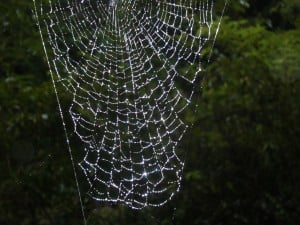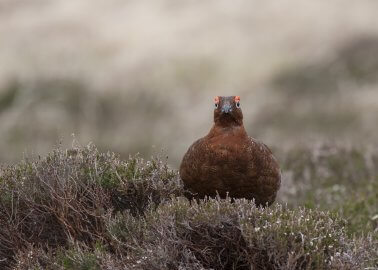Putting a Positive Spin on Spiders
 Poor old spiders. The much-maligned little critters often have a hard time of it at the hands of humans – getting squashed, washed down the plughole or sprayed with toxic insecticides.
Poor old spiders. The much-maligned little critters often have a hard time of it at the hands of humans – getting squashed, washed down the plughole or sprayed with toxic insecticides.
Recent reports about the rising numbers of false widow spiders in this country have made things even worse, inspiring an epidemic of hysterical spider-swatting, despite the fact that the vast majority of the UK’s 600 species of spiders are completely harmless. As for false widow spiders, they are not aggressive towards humans, and in most cases their bites are no more serious than a bee sting. It may be a cliché, but they almost certainly are more afraid of you than you are of them.
Instead of inspiring fear, spiders should really be exciting our curiosity and gratitude. After all, they play a vital role in our ecosystem and can also help you with your housework by taking care of other insects you might prefer not to share your home with.
Some more astonishing arachnid facts:
- Autumn is spider season. It’s when many spiders are at their maximum size and are looking for a mate, which is why, from September onwards, you’re likely to spot more of them than usual out and about.
- Spider webs are a natural technological wonder. On a weight-to-strength basis, their silk is five times stronger than steel and has been inspiring scientists and engineers for decades.
- Some spiders make music to attract a mate by plucking on the strings of their web!
- Spiders have been immortalised in literature, from Ovid’s Metamorphoses to Little Miss Muffet – and, of course, the children’s classic Charlotte’s Web.
- The diverse spider species of the world include a vegetarian jumping spider, a fishing spider who can walk on water and crab spiders, who can change their colour just as chameleons do.
If you’re still not delighted by having an eight-legged friend dropping in on you at home or hanging out on your bedroom ceiling, then please use a gentle, humane method to transfer him or her outside. The tried-and-tested cup-and-paper technique is a favourite. Alternatively, if lingering arachnophobia makes that too daunting, invest in a handy gadget – such as PETA US’ humane bug catcher, for example.



